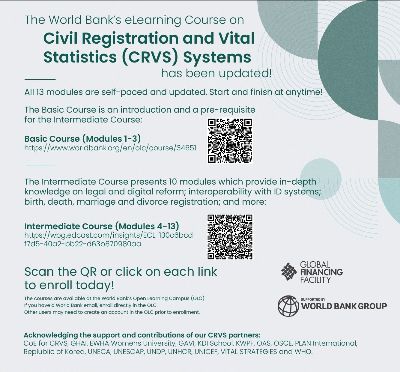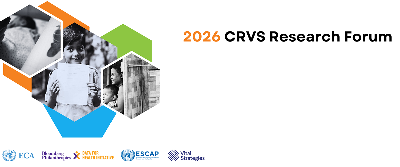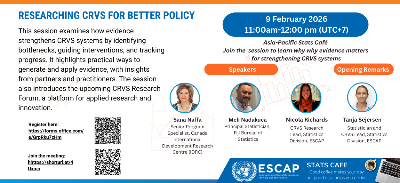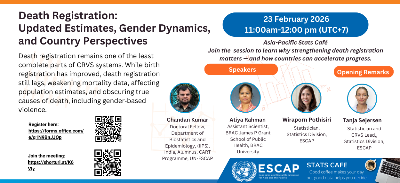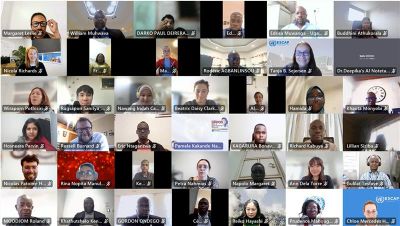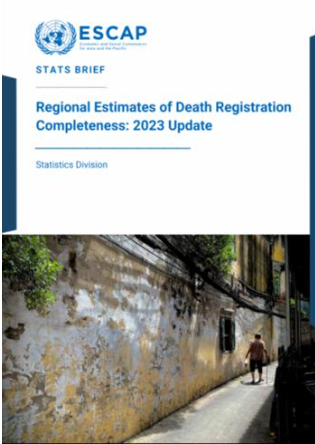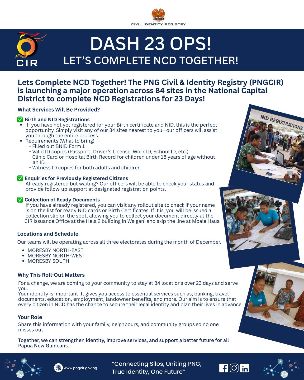(Newsletter: CRVS Insight September (2) 2022)
We are pleased to present our CRVS Champion for October's Insight newsletter: Mr. Kap Andy Calo, Director of Vanuatu National Statistics Office (VNSO). We hope our subscribers enjoy reading his valuable experiences and insights.
1. What is your current title and role?
I am the Director and the Registrar General of Vanuatu’s Civil Registration and Identity Management (CRIM) Department at the Ministry of Internal Affairs. Prior to this, I worked for 14 years at the Vanuatu National Statistical Office as a Population Statistician. I was appointed Government Statistician (Director) of VNSO in 2019 and served till 2021. You can say I am passionate about complete, accurate, and up-to-date population data. I am happy that in Vanuatu civil registration is now considered to be the fundamental source of information for legal identities. Establishing vital statistics based on civil registration data will provide insight into population demographics that the Government needs to make timely decisions that will improve the quality of life of citizens in Vanuatu.
2. Can you please share with us a particular experience that highlighted the importance of CRVS to you?
One of the biggest challenges in Vanuatu as we have matured into a nation with more formalized institutions is to ensure that we maintain our heritage and cultural knowledge while adapting to the future. For the first time since independence, we have an official National Identity Card that has helped people maintain their cultural identity while also gaining access to institutions. The National Identity Card streamlines the public administration process for getting access to education and health care, as well as voting. The National Identity Card is accessible to everyone and is something that is held with pride. We have seen a rapid uptake in people applying for ID cards. Currently, more than 77 percent of the population has a National Identity Card. Why? Because it’s efficacious in every way!
3. How are you currently involved in CRVS improvements?
The Government of Vanuatu realized that to create reliable population data, provide trustworthy legal identities, and establish quality vital statistics, it would require legal, technical, and organizational changes to manage civil registration and legal identities properly.
Regarding the legal changes, in 2022 two bills have been passed with support from UNDP/Vanuatu Electoral Environment Project (VEEP): the Civil Registration and Identity Management Act and the Vanuatu National Identity Card Act. In addition, regulations on civil registration and national identity card have been developed. A regulation on vital statistics will be developed in 2022. Also, specifically important to civil registration is the development of a Data Protection Bill that will hopefully be approved in 2022 by the Vanuatu Parliament.
On the technical front, we are currently in the final phase of testing our newly developed software for a Central Civil Register System and the Vanuatu Population Register. The system is developed in-house and will improve the standard for data quality. Establishing data quality is the most crucial element in civil registration. Therefore, a data cleaning exercise is ongoing to enable the launching of the new system with the most accurate data. However, data quality control is a continuous process and will become a structural part of the management of the new system. The Central Civil Register and Population Register will allow for interoperability of data sharing such as ID verification between its data and public institutions (as well as some private institutions such as banks). This will contribute to improving the service provided to citizens using the principle of collecting data once with multiple institutions benefiting from it. Obviously, data sharing will take place respecting the rules on data protection.
CRIM is also currently going through an organizational restructure to support and meet the needs of our new legislation, regulation and growing population. We started by addressing our Central Civil Register system (now RV5). In collaboration with international experts at UNESCAP, we went through the Business Process Improving project which included mapping all current registration processes of birth and deaths. As Vanuatu is an archipelago with over 83 islands, the mapping of the ‘as-is’ process was critical to understand the variety of ways that people are currently getting registered and to identify process bottlenecks. Be it a lack of knowledge of where to register, not having an internet connection for the register to regularly update the data or having a missing link between different ministries that play a role in the notification of vital events. Based on a multi-stakeholder effort we then successfully finalized the re-design of the business processes. This will lead to standard operating procedures as well as developing training materials for the new system and training for the staff. In addition, we have expanded our staff to support the needs of the citizens and are in the process of getting registers posted at every major hospital.
4. How would you like to see CRVS in Vanuatu develop by the end of the CRVS Decade?
We are aiming for a fully digitized civil registration process with citizens having control of their data and having the ability to update and provide correct information. This digitized process will ensure that all islands, no matter how remote, can update and have access to their personal data. This will support the idea of bringing the government and its resources to the door-step of the people as well as supporting the decentralization process in Vanuatu. We would also like to address the data gap that exists in death registration and have that improved or strengthened.
5. Which advice would you give to others trying to improve CRVS systems?
An absolute necessity for any improvement of the CRVS is ensuring the commitment of the Government and relevant stakeholders, without that support it will be difficult to make changes. Furthermore, I think it is important to fully formulate the ‘as is’ situation and determine the ‘should be’ situation. This knowledge provides the required insight in challenges, risks and leads to realistic result formulation, describing of activities, planning, and budgeting. Equally important is to communicate with citizens, timely and frequently on the implementation. Their trust and cooperation in the changes to be made is essential.




